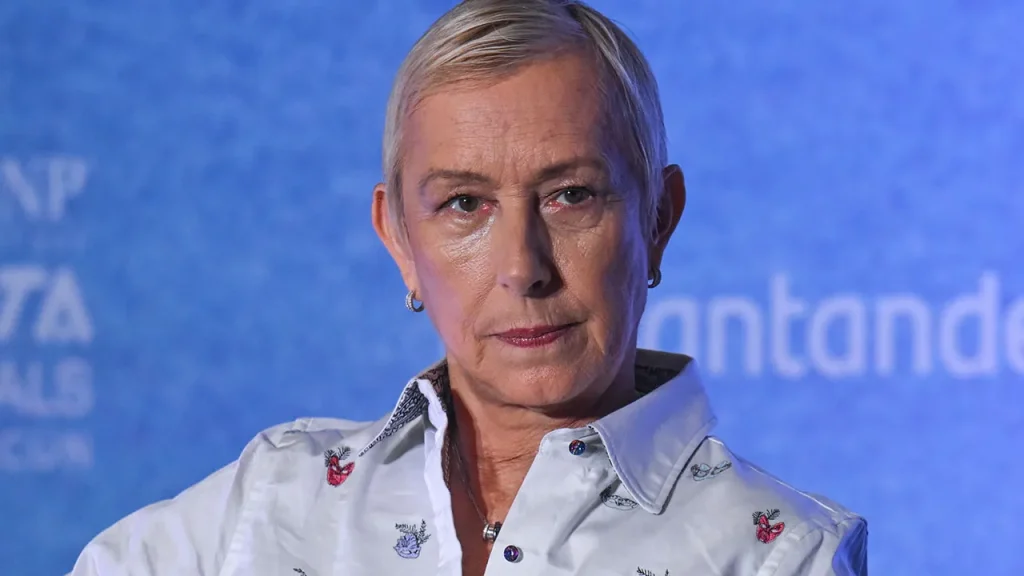Martina Navratilova’s Political Paradox: Standing for Women While “Voting Blue”
Tennis icon Martina Navratilova recently found herself in an illuminating social media exchange that highlighted the complex political position she occupies in today’s polarized landscape. The incident began when Navratilova criticized a spa being forced to allow a biological male into the women’s locker room following a discrimination lawsuit, declaring, “To say this is wrong is an understatement.” When comedian Lou Perez pointed out that her consistent Democratic support contributed to such policies, Navratilova defended her voting record by stating she voted “against totalitarianism.” When confronted with her own X profile bio—which candidly admits she votes Democrat “despite the Dems stance on women’s sex-based spaces”—Navratilova acknowledged the contradiction, explaining: “I agree with the Dems on just about every single issue but one—while I strongly disagree with Trump and his sycophants on every single issue but one.” This exchange perfectly encapsulates the political tightrope Navratilova walks as a progressive who nonetheless believes in biological distinctions in women’s spaces.
This tension in Navratilova’s politics isn’t new. Despite being a lifelong liberal and vocal Trump critic, she has become increasingly outspoken about what she sees as the Democratic Party’s abandonment of women’s sex-based rights. Last December, she expressed frustration that Republicans had claimed ownership of the transgender athlete issue, writing, “I am so mad that the Republicans captured this issue—shame on all the elected Democrats who keep silent on this!!!” Her positions reflect a growing divide within progressive politics, where some longtime liberals feel their concerns about women’s spaces and sports are being dismissed by their own political allies. Navratilova’s stance is particularly significant given her status as an openly lesbian woman who came out in 1981, making her a pioneering figure in LGBTQ+ sports history.
At the Independent Women’s Forum’s “Take Back Title IX” rally in June, Navratilova elaborated on her evolution on this issue. “Initially, being the Democrats and the women that we are for the most part, we in this group were trying to find every single possible way to include trans-identified men, males who identify as women, into women’s sports,” she explained. “And the more we try to find a way to mitigate the advantage, to handicap, to somehow to include, the more we figured out it’s not possible. It’s not possible to do it in a fair way.” This statement reveals Navratilova’s journey from seeking inclusive solutions to concluding that biological differences create insurmountable competitive inequities. She specifically referenced the controversy surrounding University of Pennsylvania swimmer Lia Thomas, which became a flashpoint in the national debate about transgender athletes in women’s sports.
Navratilova’s advocacy has come with significant personal cost. Despite her progressive credentials and decades as an out lesbian athlete and activist, she now finds herself labeled with the same derogatory terms often aimed at conservative figures. “Now, it’s, ‘Oh, you’re a homophobe.’ Go figure. I’ve been out since ’81, yeah, I’m a homophobe,” she said sarcastically at the rally. “‘You’re a bigot, you’re a transphobe, you’re a Nazi, you’re a fascist, you’re a communist,’ everything and everything in between. And this is coming from the left. I am the left! My people are turning on me. They’re turning on us, women, who speak up for women’s sex-based rights.” This experience of ostracism from her political community clearly pains Navratilova, who sees herself defending feminist principles rather than attacking transgender individuals.
What makes Navratilova’s position particularly interesting is that she represents a growing number of progressive women who find themselves politically homeless on this specific issue. Unlike conservatives who may oppose transgender rights across multiple domains, Navratilova supports transgender rights in general while drawing a line at competitive sports and intimate spaces where biological differences matter most. This nuanced position doesn’t fit neatly into either party’s platform in today’s highly polarized political environment. Her willingness to publicly maintain this stance despite criticism from fellow progressives demonstrates both her commitment to women’s rights and her willingness to break ranks with party orthodoxy when she believes principles are at stake.
The exchange between Navratilova and Perez illuminates a broader political dilemma facing many voters who find themselves agreeing with one party on most issues but strongly disagreeing on others. For Navratilova, the preservation of women’s sex-based spaces and fair competition in sports is non-negotiable, yet she remains unwilling to align with conservatives whose other positions she opposes. Her candid acknowledgment of this contradiction in her social media bio suggests she’s made peace with this tension, even as she continues to advocate for change within Democratic politics. As polarization increases and party platforms become more rigid, figures like Navratilova remind us that political identity is often more complex than a simple binary choice, especially when deeply held principles come into conflict with party positions.















